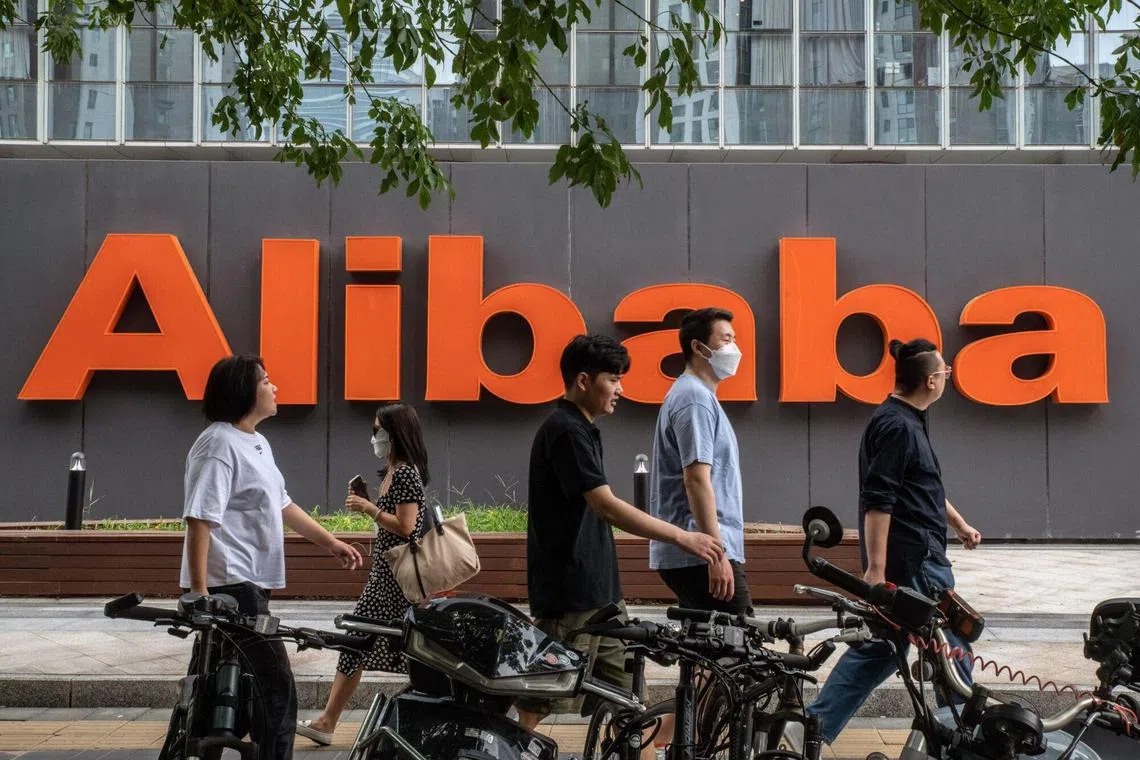Alibaba CEO ousts e-commerce chief, splits assets in new shake-up
Sign up now: Get ST's newsletters delivered to your inbox

Alibaba lost its position as China’s most valuable e-commerce operator to PDD and its hit shopping app Temu.
PHOTO: BLOOMBERG
Follow topic:
Hong Kong – Alibaba Group Holding replaced one of its most experienced executives at the helm of e-commerce and plans to create a firm to oversee its investment assets around the world, the latest in a series of sweeping changes to roil the once-dominant Chinese online juggernaut.
Chief executive Eddie Wu will replace Ms Trudy Dai, one of an inner circle of partners present when Mr Jack Ma founded the company in 1999.
She was tasked in March to head the division that runs Alibaba’s main Chinese e-commerce platforms Tmall and Taobao.
Ms Dai will instead help set up an entity to manage some of its vast portfolio of assets around the world.
Alibaba, whose investments include stakes in start-ups as well as businesses from entertainment to physical retail, described that entity as overseeing the company’s non-core assets without elaborating.
Alibaba’s shares rose 2 per cent in Hong Kong on Dec 20 after the news.
The surprise decision comes as Alibaba strives to rejuvenate a company after a series of missteps and regulatory scrutiny eroded its market dominance in past years.
Ms Dai’s departure marks the latest shake-up at the Chinese corporate icon, which has endured post-Covid-19 consumption volatility, a bruising years-long government crackdown and – most recently – the surprise ascent of rivals including PDD Holdings and ByteDance.
Mr Wu, who himself took over Alibaba just months ago, intends to cultivate new managers to steer his firm for the longer term.
The decisions for now may reflect a desire to take direct control of underperforming divisions, while exploring sales of businesses considered less essential to the main cloud, retail and logistics divisions.
Once the most valuable company in China, Alibaba has fallen behind games and social media leader Tencent Holdings.
It lost its position as China’s most valuable e-commerce operator to eight-year-old upstart PDD, which has far outstripped Alibaba’s growth with the help of hit shopping app Temu.
Mr Ma, arguably China’s most famous entrepreneur, in November broke years of silence to issue a call to arms for employees
In an internal memo announcing the latest changes to employees on Dec 20, Alibaba chairman Joseph Tsai said: “We must confront our past and change ourselves for the future.
“Soon, we will empower a new cohort of management leaders who have developed fundamental skillsets and experience from the bottom up.”
Alibaba is now bent on clawing back lost ground and investing anew in cloud and e-commerce – its two biggest businesses.
The Chinese e-commerce division accounted for more than 4 per cent of overall revenue in 2023.
Mr Wu and other executives have also talked about the need to review their investment portfolio to identify and create value from Alibaba’s assets.
Alibaba in November reported better-than-expected revenue, driven by its overseas business as well as the logistics arm Cainiao.
It is unclear, however, what the company intends to do with more peripheral operations and which ones will be folded into the holding company, which is supervised by a committee under Mr Tsai.
Those include video service Youku Tudou or its InTime department store chain.
“This is another big step to reverse Alibaba’s previous plan to split up under Daniel Zhang. Now Wu will take control of the group, cloud and Taobao-Tmall, with more consolidation of power to the group level,” said Forsyth Barr Asia research analyst Willer Chen.
“There could be more sales of non-core assets looking ahead.” bloomberg

